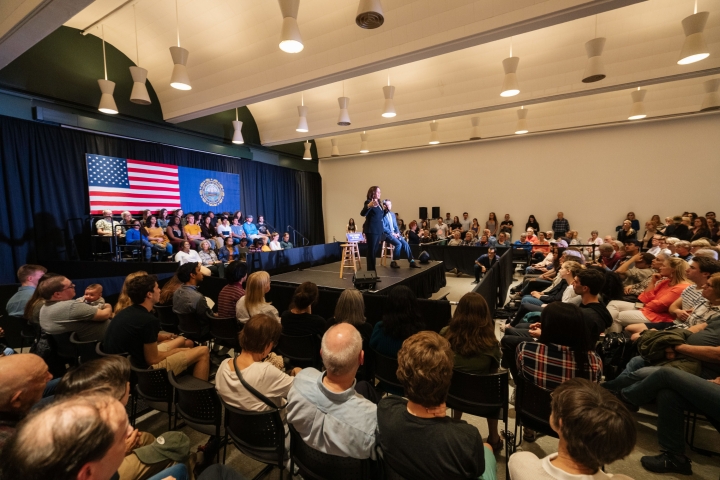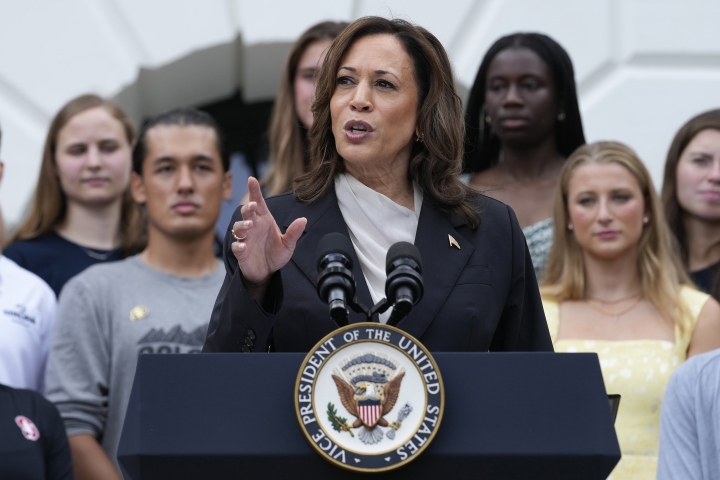As Vice President Kamala Harris rallied Democrats around her campaign on Monday after President Joe Biden withdrew from the presidential race and threw his support to her, Dartmouth observers said the race is more competitive, but Harris faces several challenges.
Anna Mahoney, the executive director of the Nelson A. Rockefeller Center for Public Policy Studies, said Harris must answer the same question any Democratic nominee has to answer: Can she beat former President Donald Trump? The answer will depend on how the base of the party responds to her sudden candidacy.
“In addition to these concerns, as a biracial woman, Harris has to contend with a number of additional hurdles her white male colleagues do not face, which include biased media coverage, gendered and raced criticisms from the Trump campaign, along with heightened expectations of ‘the first’—the first woman of color at the top of a major political party ticket,” said Mahoney, whose research interests focus on the intersection between identity and representation.
As an example of the loaded criticisms directed at Harris, Mahoney noted that when Harris ran at the start of the 2020 presidential primaries, she faced questions about her previous romantic partnerships, her role as stepmother to her husband’s children, and criticism of her treatment of staff. And as vice president, she has been criticized for not doing enough when the role itself is designed to be supportive of the president, Mahoney said.
“She is facing significant challenges, but her political history suggests she is up to the task. She navigated the 2020 primary to the vice presidential nomination, and she challenged Supreme Court nominee Brett Kavanaugh and Attorney General William Barr in Congressional hearings, all of which suggests she is prepared for a general presidential campaign against former President Trump if the Democratic Party ultimately nominates her in August,” Mahoney said.
Professor of Government Dean Lacy said Biden’s decision has dramatically changed the dynamics of the election, given that Biden’s prospects for winning were declining because of growing concerns about the 81-year-old incumbent’s health and age.
“Kamala Harris immediately makes the election competitive, and she is likely to gain momentum rather than lose it as Americans see her in action as the nominee and associate her with the presidency,” Lacy said. “The open vice president slot gives Harris the potential to pick a VP from a critical swing state, such as Pennsylvania, Michigan, Arizona, or North Carolina.”
Lacy also said having Harris at the top of the ticket would help Democrats regain younger voters, especially women, and “should help slow or stop the swing of Black voters toward Trump. Recent polling shows Trump with the highest support among Black voters of any Republican since the 1950s. Black voters are critical for winning in the large swing states.”
As a political scientist, Lacy said he would be interested in an “open convention” where Harris would have to compete with other prospective Democratic candidates, but also said it would “not be good for Democrats and would add even more uncertainty to what is becoming the most volatile election campaign in American history.”
Government professor Sean Westwood, the director of the Polarization Research Lab, said it was important that Biden withdraw from the race considering the concerns opponents of Trump are raising about the Republican’s actions on Jan. 6 and his plans to crack down on political opponents should he regain the White House.
“Biden was running on a ‘vote democracy’ platform, but given his cognitive decline, the Biden campaign was advocating for what would amount to a puppet leader overseeing a shadow government steered by Biden’s family, an unelected cabinet, and political advisers,” Westwood said. “This would be incredibly antidemocratic and would cede the pro-democracy high ground.”
Democratic activists on campus embraced the decision by Biden to drop out of the race and back Harris. Dartmouth Democrats President Prescott Herzog ’25, who will be a delegate from New Hampshire to the Democratic National Convention next month, praised Biden for his work on “pro-climate legislation, defending reproductive rights,” and the economy, and noted that the 25 pledged delegates from New Hampshire, including himself and two other Dartmouth students, had followed Biden’s lead and announced their support for Harris’ nomination.
“We are thrilled to make the case for her campaign on campus and across New Hampshire,” Herzog said.
Ajayda Griffith ’27, who is a member of the Dartmouth Minority Pre-Law Association and the Black Underground Theater Association and is interning this summer for U.S. Sen. Kirsten Gillibrand ’88, D-N.Y., is “very hopeful” about Harris’ candidacy.
“I have found myself with newfound enthusiasm and optimism for the race. Although there will be naysayers who discount Harris’ ability to succeed due to her identity as a woman of color, I believe that she is more than qualified to do the job,” Griffith said. “The same negative rhetoric used to doubt Harris is the same one that likely talked many other Black and brown women out of doing things that they knew they were more than capable of doing. She will stand as a symbol for all women of color not to doubt themselves.”
But Westwood, the polarization specialist, noted that Harris and Biden both had not been doing well in approval polls.
“The Democrats will struggle to win this year,” Westwood said.

And Alex Azar ’25, president of Conservative Students of Dartmouth, praised Biden for his “lifelong commitment to our country” but questioned whether Harris and other Democrats were “complicit in hiding Biden’s deteriorating condition from the public” and should be held to account.
“Biden’s problems will become hers. Perhaps more importantly, if made the nominee, Harris would not have received a single (valid) vote in a Democratic primary for president; in 2019, she dropped out two months before voting,” Azar said. “These two ready-made stumbling-blocks—combined with only a moderately better net-favorability score compared to her endorser—don’t bode well for a matchup with a rising-tide-Trump.”
